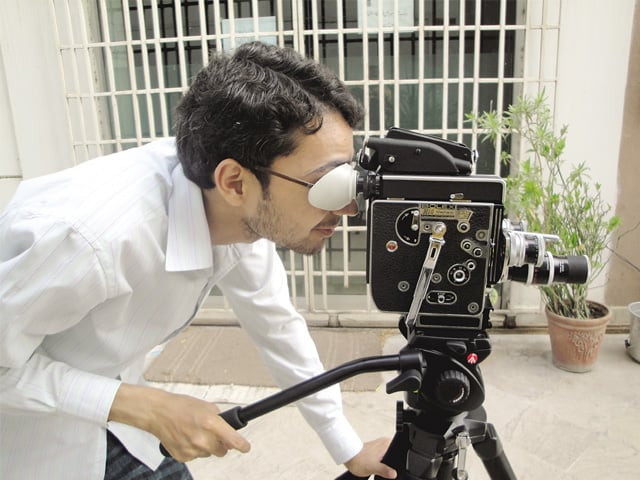Students of media school explore domestic violence and slavery in short films
Students explore effects of violence through 15 short films.

In a span of not more than two minutes each, the students explored subjects such as domestic violence, homosexuality, slavery, humour and desensitisation due to violence in a total of 15 films shot on 16mm.
The black-and-white films were shown through a conventional telescope while the colour ones were converted to “telecine” and then shown on CD. For these first- and second-year students, the experience of handling everything from concept-making, directing and writing to cinematography, lighting and editing was thrilling to say the least.
For Hussain Afzal, the real learning experience came from using the conventional film roll. “With the roll, we could only take one or two retakes so we had to be perfect,” he explained. “We edited the film manually using blades and a slab instead of using premiere and seeing through the movie scope. These rolls were then sent to Berlin to develop and that’s how it all happened.”
Ramsha Zia, a second-year student of Szabist Media Studies programme who was part of the audience, said that it was a learning experience since the films were shot on film instead of using digital tools. She found the black-and-white films “just okay” but thought that the colour ones were “a lot more dynamic” in content and style.
The students seemed to have discovered their specialisations as was evident in their choice of subject. Sara Jamil focused on emotions and messages and her two short films were appreciated by the audience. In her first film, which was a silent depiction of ‘hope’, Jamil showed a desolate man finding light at the end of a tunnel. Through ‘Facade’, Jamil showed a clown and his different faces in an effort to highlight the different personalities, the same person adopts in society.
Jamil felt, however, that filmmaking is a difficult field for women. “Women are usually taken so lightly that even when they make a super hit film, they will still have to start from scratch for the next one,” she said.
Her colleague, Imtesal Rahat showed light humour short flicks while Abdul Rehman wanted to make Bollywood-like “masala” films. Abdul Rehman said that he left filmmaking schools in the UK to join SAAMPT, mainly because he found opportunities to gain early experience.
All the students agreed that experience and portfolios were far more important than a degree in filmmaking. Daneyal Sufi completed his Bachelors in Media Sciences from the University of Lancaster, UK, but joined SAAMPT before going for a postgraduate degree.
“It is the only school in the country which focuses on filmmaking and allowed us to start making films right from the beginning,” he said. He believed that this institution will give him the opportunity to develop a good portfolio for a university in Hong Kong, where he wishes to pursue his Master’s after taking inspiration from Jackie Chan’s words “Hollywood is the Xerox copy of Hong Kong cinema”.
SAAMPT dean Daniyal Ali Khan was proud to see that his students had performed better than his expectations. By giving his students, good quality equipment and confidence, he believed he is unleashing the talent that other media schools in the country are failing to exploit. “It is a field in which people don’t want to see your degree but your portfolio and that is what we focus on,” he said.
Khan felt that filmmaking as a talent is fizzling out because students don’t get trained at the right time and “ultimately end up becoming a VJ or an anchor instead of a director.”
Although he is teaching a small group, Khan seemed happy with his pupils. “My students are 10 years ahead and those in the media sciences programmes of other schools are 50 years behind.”
Published in The Express Tribune, January 30th, 2011.



















COMMENTS
Comments are moderated and generally will be posted if they are on-topic and not abusive.
For more information, please see our Comments FAQ